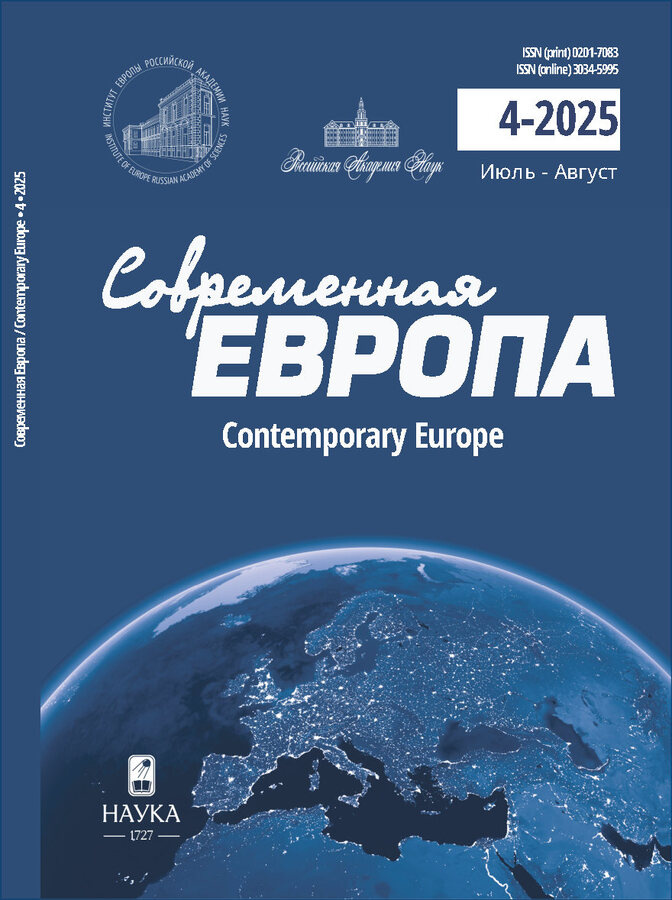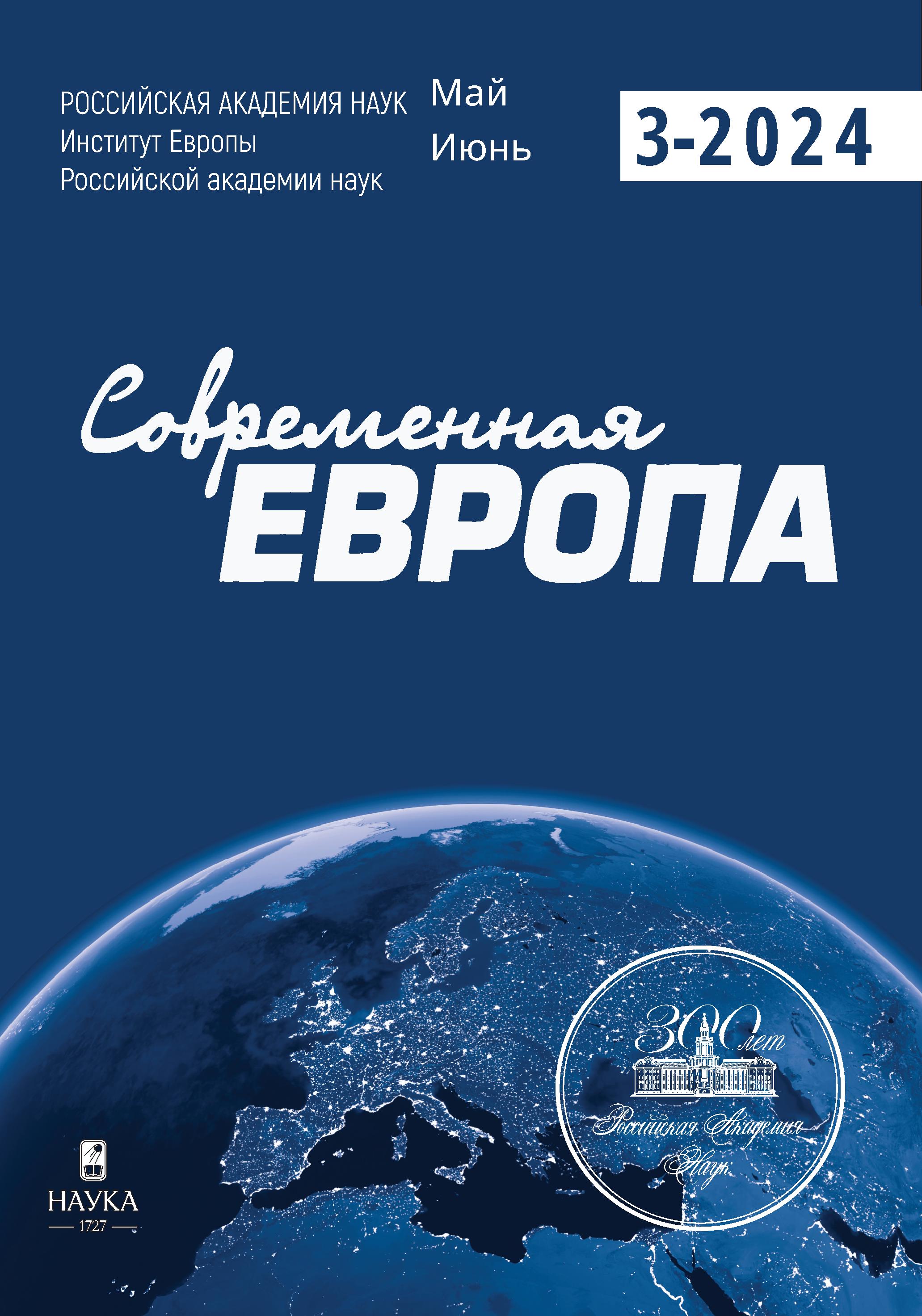ПОЗИЦИИ ВЕДУЩИХ ЕВРОПАРТИЙ НАКАНУНЕ ВЫБОРОВ В ЕВРОПЕЙСКИЙ ПАРЛАМЕНТ 2024 г.
- Авторы: ГУСЕЛЕТОВ Б.П1,2
-
Учреждения:
- Центр партийно-политических исследований, Институт Европы РАН
- Ташкентский государственный юридическмй университет
- Выпуск: № 3 (124) (2024)
- Страницы: 68-81
- Раздел: Статьи
- URL: https://genescells.com/0201-7083/article/view/652122
- DOI: https://doi.org/10.31857/S0201708324030069
- ID: 652122
Цитировать
Полный текст
Аннотация
В статье проанализированы основные тренды трансформации партийно-политической системы Евросоюза в канун выборов депутатов Европейского парламента 2024 г. Рассмотрены основные события последних лет, отмечены новые тенденции изменения системы, которые заключались в укреплении популярности и влиятельности евроскептических партий, усилении напряженности в отношениях старых и новых членов Евросоюза. Показано, что по итогам национальных парламентских выборов, прошедших за последние пять лет практически во всех странах-членах, заметно сократилось влияние ведущих политических партий, которые долгие годы занимали доминирующие позиции в органах исполнительной и представительной власти. Рассмотрен феномен усиления представительства женщин в органах власти ЕС и стран-членов. Проанализированы изменения в социальной структуре европейского сообщества и их воздействие на электоральные предпочтения. Представлены предвыборные позиции ведущих европейских партий, которые имеют фракции в Европейском парламенте, включая предвыборные манифесты и кандидатуры на пост главы Европейской комиссии - так называемые Spitzenkandidaten (ведущие кандидаты). Изучены прогнозы результатов участия общеевропейских политических партий в евровыборах 2024 г. и возможные варианты создания поствыборных межпартийных коалиций, которые определят позицию Европарламента при утверждении кандидатуры главы Еврокомиссии и ее состава.
Ключевые слова
Об авторах
Б. П ГУСЕЛЕТОВ
Центр партийно-политических исследований, Институт Европы РАН; Ташкентский государственный юридическмй университет
Email: bgusletov@mail.ru
Доктор политических наук, доцент, профессор Москва, Россия; Ташкент, Узбекистан
Список литературы
- Алексеенкова Е.С. (2019) Страна победившего популизма: Италия после выборов. Современная Европа. № 2. С. 106‒117.
- Бауман З. (2008) Текучая современность. Питер, Санкт-Петербург. 240 с.
- Гуселетов Б.П. (2023) Праворадикальные общеевропейские партии накануне общеевропейских выборов 2024. Актуальные проблемы Европы. № 4. С. 38‒60. doi: 10.31249/ape/2023.04.03 Мюллер Я.-В. (2018) Что такое популизм? Изд. дом Высшей школы экономики, Москва. 144 с.
- Осколков П.В. (2019) Правый популизм в Европейском союзе. ИЕ РАН, Москва. № 365. 164 с.
- Шишелина Л.Н., Лункин Р.Н. (ред.) (2020) Выборы в Вишеградских странах 30 лет спустя. Особенности избирательных кампаний 2019–2020 гг. ИЕ РАН, Москва. 146 c.
- Buzmaniuk S. (2024) 2024, une année politique européenne – vue par les femmes. Fondation Robert Shuman. 04.03. URL: https://www.robert-schuman.eu/questions-d-europe/739-2024-uneannee-politique-europeenne-vue-par-les-femmes (accessed: 20.03.2024).
- Cunningham K., Dennison S., Hix S., Learmonth I. (2024) A sharp right turn: A forecast for the 2024 European Parliament elections. The European Council for Foreign Relations. Policy Brief. 23.01. 25 p. URL: https://ecfr.eu/publication/a-sharp-right-turn-a-forecast-for-the2024-european-parliament-elections/ (accessed: 20.03.2024).
- Filip A. (2021) Eurosceptic Contagion and European Elections. Eurosceptic Contagion. Ed. by A. Filip. Springer, Cham, Switzerland. P. 137‒150. doi: 10.1007/978-3-030-69036-6
- Joannin P. (2023) Nouveaux équilibres politiques en Europe à un an des élections européennes. Fondation Robert Shuman. 12.06. URL: https://www.robert-schuman.eu/fr/questionsd-europe/0673-nouveaux-equilibres-politiques-en-europe-a-un-an-des-elections-europeennes (accessed: 20.03.2024).
- Håkansson C. (2021) The European Commission’s new role in EU security and defence cooperation: the case of the European Defence Fund. European Security. Vol. 30. Issue. 4. P. 589‒608. DOI: https://doi.org/10.1080/09662839.2021.1906229
- Mortera-Martinez C., Tordoir S. (2023) Hungary, Poland and the EU: It’s the money, stupid? INSIGHT: Center for European Reform. 08.02. URL: https://www.cer.eu/sites/default/files/insight_CMM_ST_hungary_pol_8.2.23.pdf (accessed: 20.03.2024).
- Müller M. (2024) European Parliament seat projection (February 2024): EPP extends lead, far-right surge slowed down. Foederalist.eu. 02.2024. URL: https://www.foederalist.eu/2024/02/ep-seat-projection-february-2024.html (accessed: 20.03.2024).
- Persson T., Karlsson C., Mårtensson M. (2022) The influence of Eurosceptic challenger parties on mainstream party behaviour: Is oppositional behaviour contagious? Party Politics. Vol. 29. Issue 1. P. 100‒111. DOI: https://doi.org/10.1177/13540688211051
- Pirro A., Taggart P., Kessel S. (2018) The Populist Politics of Euroscepticism in Times of Crisis: Comparative Conclusions. Politics. No. 3(38). P. 378‒390. DOI: https://doi.org/10.1177/0263395718784704
- Porumbescu A., Livia D.P. (2021) Gender Equality in the European Union. From Strategic Engagement to Achievements. Revista de ȘtiințePolitice. Issue 72. P. 68‒79.
- Schwartz W. (2022) Protecting the Rule of Law in Hungary and Poland. Wilson Center. 07.11. URL: https://www.wilsoncenter.org/article/protecting-rule-law-hungary-and-poland (accessed: 20.03.2024).
- Alekseenkova E.S. (2019) Strana pobedivshego populizma: Italia posle viborov: Italia posle viborov. [The country of winning populism: Italy after elections], Sovremennaya Evropa, 2, pp. 106‒117. (In Russian).
- Bauman Z. (2008) Tekutchaia sovremennost [Liquid Modernity], Piter, St. Petersburg, Russia. (In Russian).
- Belova G., Ivanova A. (2023) EU Institutions: Revisiting Gender Balance and Women’s Empowerment, Laws, 12(1), 3. DOI: http://doi.org/10.3390/laws12010003
- Buzmaniuk S. (2024) 2024, une année politique européenne – vue par les femmes, Fondation Robert Shuman. 04.03. URL: https://www.robert-schuman.eu/questions-d-europe/739-2024-uneannee-politique-europeenne-vue-par-les-femmes (accessed: 20.03.2024).
- Cunningham K., Dennison S., Hix S., Learmonth I. (2024) A sharp right turn: A forecast for the 2024 European Parliament elections, The European Council for Foreign Relations. Policy Brief, 23.01. URL: https://ecfr.eu/publication/a-sharp-right-turn-a-forecast-for-the-2024-europeanparliament-elections/ (accessed: 20.03.2024).
- Filip A. (2021) Eurosceptic Contagion and European Elections, in Filip A. (ed.) Eurosceptic Contagion, Springer, Cham, Switzerland. P. 137‒150. doi: 10.1007/978-3-030-69036-6 Guseletov B. (2023) Pravoradikalnie obshceevropeiskie partii nakanyne obcscheevropeiskih viborov 2024. [Right-wing pan-European on the eve of the pan-European elections], Actual Problems in Europe, 4, pp. 38‒60. doi: 10.31249/ape/2023.04.03 (In Russian).
- Joannin P. (2023) Nouveaux équilibres politiques en Europe à un an des élections européennes, Fondation Robert Shuman, 12.06. URL: https://www.robert-schuman.eu/fr/questionsd-europe/0673-nouveaux-equilibres-politiques-en-europe-a-un-an-des-elections-europeennes (accessed: 20.03.2024).
- Håkansson C. (2021) The European Commission’s new role in EU security and defence cooperation: the case of the European Defence Fund, European Security, 30(4), pp. 589‒608. DOI: https://doi.org/10.1080/09662839.2021.1906229.
- Mortera-Martinez C., Tordoir S. (2023) Hungary, Poland and the EU: It’s the money, stupid?, INSIGHT: Center for European Reform, 08.02. URL: https://www.cer.eu/ sites/default/files/insight_CMM_ST_hungary_pol_8.2.23.pdf (accessed: 20.03.2024).
- Muller Y.-V. (2018) Сhto takoe populism? [What is populism?], Publishing House Higher School of Economics, Moscow, Russia. (In Russian).
- Oskolkov P.V. (2019) Pravyj populizm v Evropejskom soyuze [Right-wing populism in the European Union], IE RAS, Moscow, Russia. (In Russian).
- Persson T., Karlsson C., Mårtensson M. (2022) The influence of Eurosceptic challenger parties on mainstream party behaviour: Is oppositional behaviour contagious?, Party Politics, 29(1), pp. 100‒111. DOI: https://doi.org/10.1177/13540688211051
- Pirro A., Taggart P., Kessel S. (2018) The Populist Politics of Euroscepticism in Times of Crisis: Comparative Conclusions, Politics, 3(38), pp. 378‒390. DOI: https://doi.org/10.1177/0263395718784704.
- Porumbescu A., Livia D.P. (2021) Gender Equality in the European Union. From Strategic Engagement to Achievements, Revista de ȘtiințePolitice, 72, pp. 68‒79.
- Schwartz W. (2022) Protecting the Rule of Law in Hungary and Poland. Wilson Center. 07.11. URL: https://www.wilsoncenter.org/article/protecting-rule-law-hungary-and-poland (accessed: 20.03.2024).
- Shishelina L.N., Lunkin R.N., ed. (2020) Vybory v Vishegradskih stranah 30 let spustya. Osobennosti izbiratel'nyh kampanij 2019–2020 gg. [Elections in the Visegrad countries 30 years later. Features of the 2019‒2020 election campaigns], IE RAN, Moscow, Russia. (In Russian)
Дополнительные файлы











